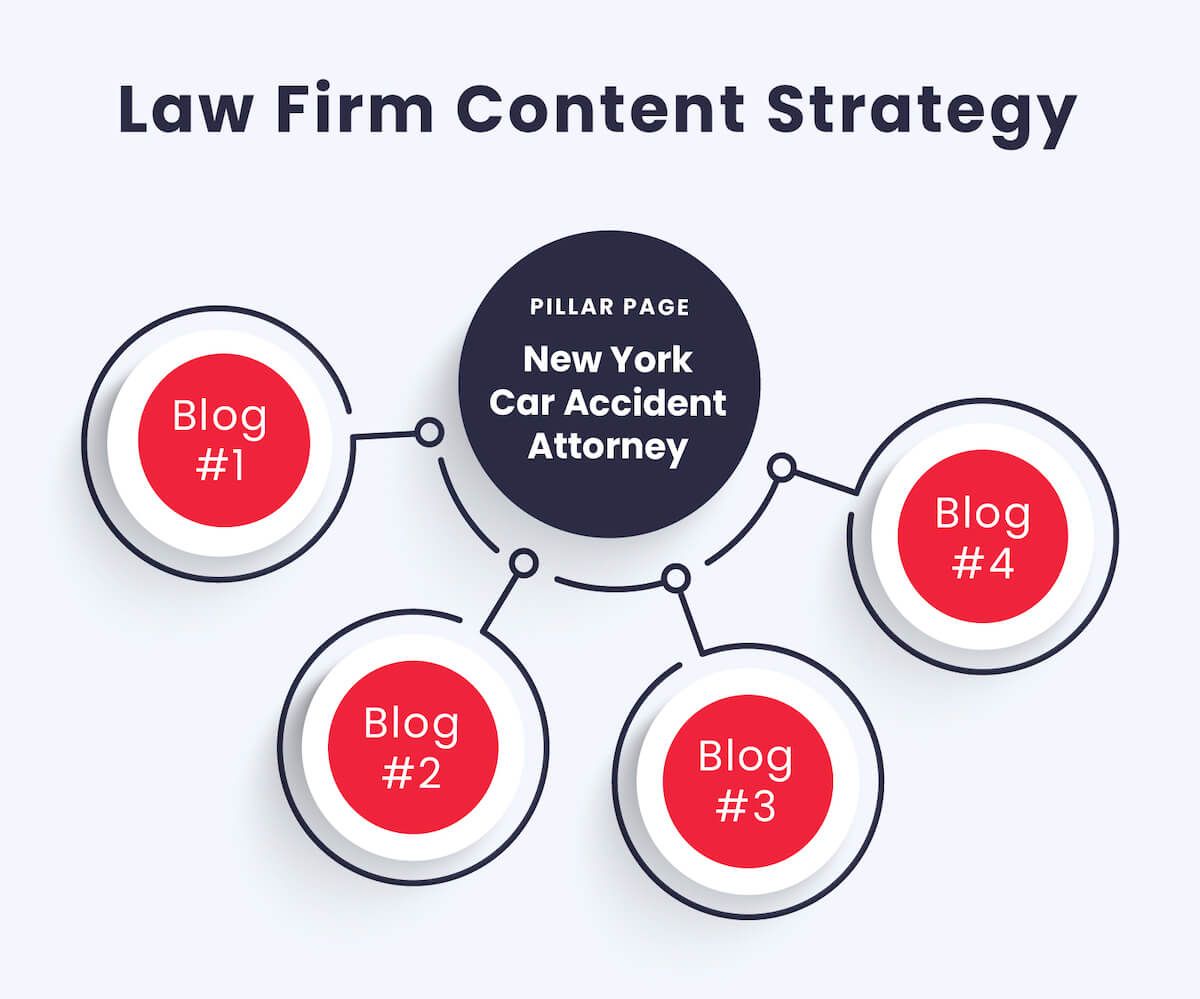

Website Content Marketing For Law Firms
A quality law firm website requires many components, and website content is at the heart of it. To reach potential clients with your message and brand yourself as the legal expert in your practice area, the content on your site must be high-quality.
Yet, it’s also important to have quality content for SEO purposes. Content has a direct impact on search engine rankings, making it a critical component of digital marketing.
So, how can you create good law firm website content that works with your search engine optimization goals and get the right message to prospective clients? The answer lies in creating a legal content strategy for your website.

What is a content strategy?
A content strategy is a well-researched, highly organized plan that targets particular demographics and writes according to their interests or needs. A content strategy is developed after hours of competitor analyses and market research.
Within the strategy, you will have identified the different types of content you aim to produce over time. These various pieces should speak to a specific goal that is relevant to your firm. Of course, the goal of most legal marketing is to get more qualified leads. However, you should also consider using content to establish yourself as a thought leader within the legal profession.
With a content strategy in place, every piece of content you create for your website integrates well with your web design and your marketing goals. This helps attorney websites and website owners create rich, compelling content that appeals to the readers and the search engines.
Why is website content for law firms necessary?
Your legal website is your online storefront. It shows potential clients what you offer, who you are, and why they should hire you for their legal needs. It must convey the right image if you are going to grow your firm through online marketing.
Yet, that goes beyond just website design. Website visitors are coming to your site for information. A site that has high-quality content is going to impress. Specifically, law firm website content helps your firm in these ways:
1. Improves your image
The quality of your content has a direct impact on your image to website visitors. If a potential client finds a website full of misspellings and grammatical errors, they will not trust you as a lawyer. Informative, well-written content also brands you as a thought leader.
2. Improves your search engine optimization
The content on your site is what the search engines crawl when deciding rankings, including the title tags, meta descriptions, and the content itself.
According to Moz, website content helps with your SEO efforts in two ways. First, it offers a search-friendly, crawlable resource to help the search bots find your website. Second, it shows the search engines that your site is relevant, important, and useful.
Ultimately, quality content directly impacts how well your website performs in the search engine results.
3. Improves your website’s user experience
Most people come to a legal web page looking for information of some sort. It may be contact information for a law practice, legal advice for their legal problem, or testimonials that help them trust the law firm for which they are searching.
Without content, they won’t be able to get what they need from your website. Content means you get a great user experience on your site, and that, in turn, helps improve your SEO by reducing your bounce rate and other negative metrics.

What are some best practices for law firm content creation?
If you invest time and energy in web content for your law firm, you will want to consider some essential tips. These practices will help your law practice with its content writing goals so that you can support your digital marketing efforts.
1. Determine your goals for your website
Before you begin writing landing pages, home pages, and other content, first determine the goals you have for your website. Some goals may include:
- Building an online presence
- Showcasing your legal expertise
- Gaining new clients or leads
- Reaching a specific target audience with your offerings
- Supporting your search engine optimization efforts
You can have more than one goal for your website. Write them all down, then prioritize them. This will help you determine your goals as you create your content. It will also dictate the type of content you spend the most time creating.
2. Determine your audience
While you probably want your law firm website content to support your online marketing efforts, ultimately, you are writing to readers. This means you need to ensure that your site reaches an audience well. Spend some time determining who your audience is so that you can direct your writing more specifically.
Once you know your audience, make sure all new content fits their needs. For instance, if you are a personal injury attorney, you may need short, direct content that gets people to call you. However, if you work in real estate or corporate law, you may need a more professional tone and longer content pieces.
3. Keep web design in mind
Finally, keep the overall web design and the way it interacts with the user experience in mind. Website readers like to see short, scannable paragraphs with many headings and images sprinkled throughout the page.
Even if you are creating long-form copy, keep the wiring concise when you can. Use bullet points and images to break up long content blocks as often as possible.
4. Keep SEO in mind
Finally, make sure you are creating content with SEO in mind. If you are not working with an online marketing firm, consider hiring one. You can also check out our Beginner’s Guide to SEO for tips to help you create content that incorporates SEO best practices.
What content should my lawyer website have?
As you build your website content, make sure you are thorough. You have multiple opportunities to showcase what you offer as a law firm, so be careful to include as much as you can.
Practice area page content
At the heart of your content should be your plans for each page. The content on each page needs to tell the reader something they need to know. This information might be why they should hire your firm, and it might be some legal advice in their area of concern.
Optimize each website page with keyword research and local search terms, if applicable. Consider adding FAQs to as many pages as possible in your law firm website design because these can earn you a spot in the frequently asked questions part of the search engine results (SERP) page.
Attorney biographies
Tell your website visitors about your legal team. Biography pages give you a place to highlight past cases, education, and years of experience. Be sure to include a picture so your readers can put a face with the name.
Infographics
Infographics are a great tool to get information onto your website in an engaging way. They also give you a piece of content that your readers can easily share on social media.
According to SEMRush, infographics are an effective SEO tool, too. They are mobile-friendly, easily-shared pieces of content, and you can add written content to the page to give the bots something to crawl. This effectively means that from 2016 to 2020, marketers had a 65% increase in the number of infographics they used.
Contact information
While this is a small part of your web design, make sure every page has your name, address, and phone number, commonly called NAP. This information should match your Google Business Profile (previously known as Google My Business) and other online listing directories to avoid confusion.
Contact form
Make the contact form prevalent on most pages of your site. You want people to know how to contact you when they are ready to schedule a consultation or hire your firm.
Legal blog
Consider adding a legal blog to your website. A blog is an excellent way to engage in content marketing and brand yourself as a legal expert. Remember to include authorship to demonstrate your expertise, authority, and trust (E.A.T.).
Testimonials and case studies
Include a section on your site dedicated to feedback from former clients. You should also post case studies from cases you won or settlements. This section of your website will create validity in the mind of readers.
What makes content high quality?
Law firm website content will be high-quality content when it follows standard rules for web content writing.
Make it pertinent
You can write content that is quite lengthy, but it may lack quality. Make sure your content is pertinent to the information your readers need to know.
Make it readable
First, make the content readable to the average viewer. Keep in mind that content for legal websites often has terminology average readers don’t understand. Translate this into something most people can understand.
To make your content readable, you also can add headings that make it easy to scan the page and see what it says. Never put more than 300 words per heading to help with this.
Finally, make it short. Sentences should be 20 words or fewer most of the time. Paragraphs should be four to five sentences.
Make it active
Passive voice is a common grammar mistake that many writers (understandably) make. However, you should avoid using it as much as possible in your writing. Instead of saying::
- The lawsuit is scheduled to go to court on Friday.
Say:
- The court will hear the lawsuit on Friday.
Active voice writing is more concise and more direct. These both help the quality of your writing.
Online tools like the Hemmingway App can help you analyze your website for active and passive voice.
Focus on proper grammar
In addition to using active voice, make sure your grammar is strong. Use tools like Grammarly to double-check your grammar and spelling before publication.
Be direct
When someone lands on your site, give them the answer to their question or need right away. Site visitors will click away quickly if they feel that your website’s content rambles without providing the information they need.
If your page will answer more than one question, keep the answers close to the headings. This structure impresses the reader and tells the search engines that your site will deliver what the searcher wants to find.

How can my law firm develop a content strategy?
To effectively use content, you must have an effective content strategy. Without a strategy in place, you will waste your time creating content that does not convert. So, how can you make a content strategy?
Start with keyword research
First, you must perform keyword research. Keyword research involves finding those phrases people will use to search for the type of content you offer.
To perform keyword research, use tools like SEMrush or ahrefs.com. You can also do some searching on your own and see what pops up for your key search terms. Check related searches at the bottom of the page, and see if you can incorporate some of that terminology in your pages.
You can also research your competition by pasting a URL into a keyword research tool. The tool will instantly show you what keywords the competitor is ranking well for, and you can incorporate those into your content.
Consider your marketing goals
Next, consider your marketing goal for your online content. Do you want to gain leads, get new clients, or work on your firm’s branding? Identifying this goal will direct the focus of your content creation.
Write to search intent
When you decide content to write, consider the intention of the people searching for a particular keyword. Write content that fulfills that intent.
For instance, if someone searches “family law attorney near me,” chances are they have a family law concern and need to hire an attorney. You should target this keyword to that particular need, incorporating other keyword strands that would also meet the need of someone with a family law concern.
Schedule your content carefully
Scheduling content to keep your website fresh and relevant is a key component of a content strategy. Create a publication calendar that includes press releases, blog posts, and new website pages so you always have something fresh to publish.
Use content briefs
Finally, using all of the information above, create content briefs. A content brief is an outline that a writer uses to write content. The brief should include:
- All important keywords
- Links that make you look authoritative
- Purpose of the page
- Information about search intent
- Links to competitors you wish to outrank
- Word count
A well-thought-out content brief that has these details will lead to high-quality content that meets your goals.
Consider hiring help
As an attorney, you are a busy professional. It takes a lot of effort and time to run a successful law firm. You may not have the time to write clean, effective content.
Not only that, but your expertise is in law, not web copy. While your legal work does mean you spend quite a bit of time writing, that writing is for a legal audience, not a client audience.
You need a professional who understands web content writing and has the time to focus on your content needs.
Thankfully, you can get help with this task. Professional copywriters and website design firms often provide content creation as part of their overall service offerings.
How can Array Digital help with website content for law firms?
Unless you are an expert at Google Analytics, keyword research, and writing, you may struggle to write quality law firm website content. Content and content strategy is where Array Digital can help.
We offer content planning and creation as part of our comprehensive SEO marketing packages for law firms.
Our team includes skilled legal writers who can help you build a library of excellent content that will help your marketing goals. Partnering with us allows you to focus on your firm while we focus on building your content.
Because our focus is on digital marketing, specifically search engine optimization, web design, social media and PPC advertising, you have the confidence that the content we create will help you rank well. We also work entirely within the legal field, so we know how to reach your target audience.
Schedule a consultation to discuss website content today
Don’t leave your content creation to chance. Partner with the experts at Array Digital to start generating effective content that converts. Use your website content to bring in new search traffic and turn that traffic into new cases.
A well-designed website generates new business. That requires the right content. Call the legal digital marketing experts of Array Digital at 757-333-3021 to speak to a member of our experienced legal team.
Or, use our online contact form, and we’ll be in touch!
-
Website Design
-
Online Advertising
-
Law Firm SEO
-
Local SEO
-
Content Marketing
-
Lead Generation
-
Family Law
-
Immigration Law
-
Personal Injury
-
Criminal Defense & DUI
Everything you need to know about hiring a digital marketing agency:
- The four pillars of digital marketing
- Digital marketing options and costs
- The pitfalls to avoid
- What to expect when working with an agency
- The qualities to look for in a digital marketing agency


